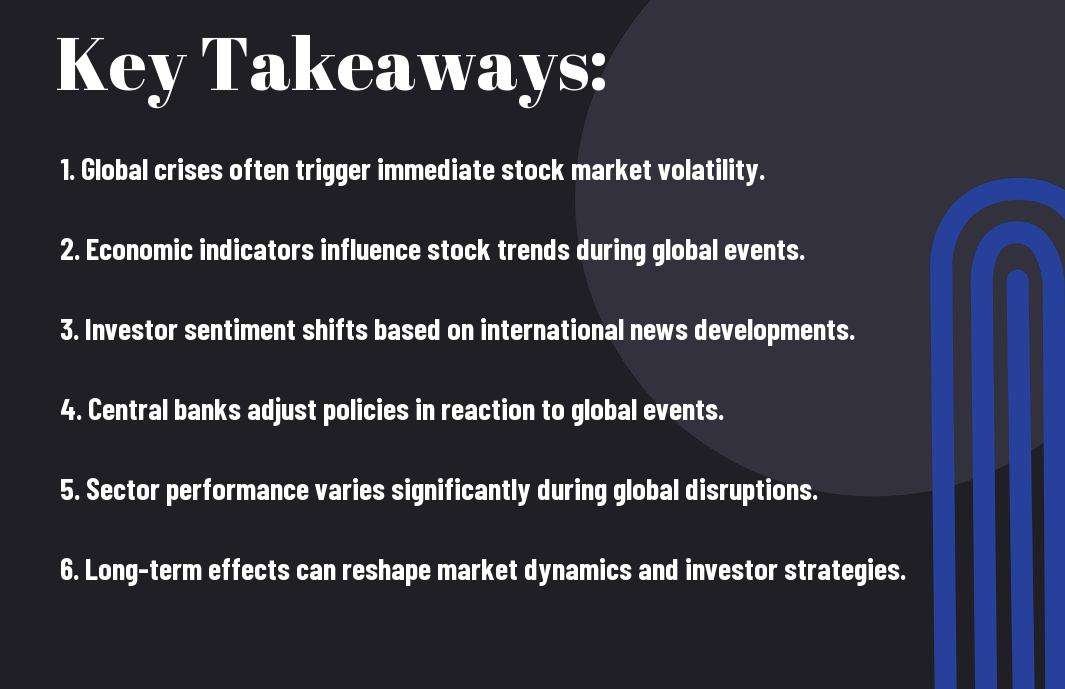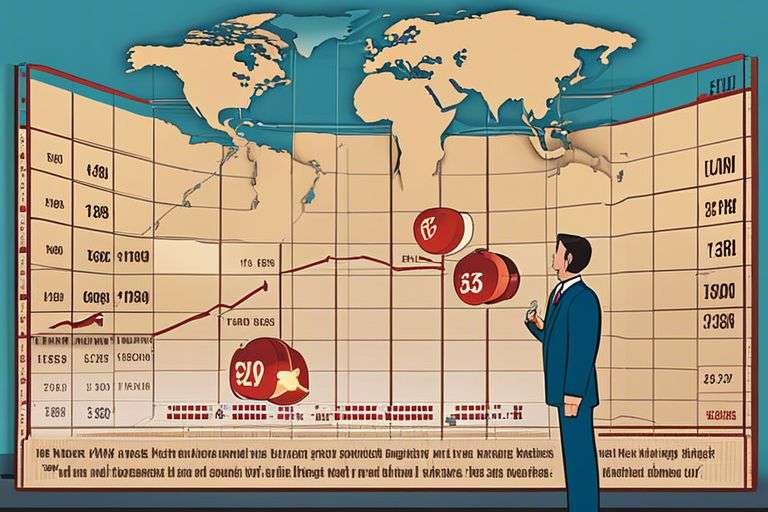It’s crucial for you to understand how global events can significantly influence stock market trends. From geopolitical tensions to natural disasters and major economic policies, these events often create volatility that can either spur growth or lead to downturns. By staying informed about these factors, you can make more strategic investment decisions and manage your portfolio effectively. Understanding the interplay between global occurrences and market responses not only enhances your investment strategies but also prepares you to navigate the unpredictable nature of the financial landscape.
Key Takeaways:
- Global Events Influence Market Volatility: Major global events, such as geopolitical tensions, natural disasters, or economic crises, can lead to significant fluctuations in stock market indices, highlighting the interconnectedness of global economies.
- Investor Sentiment Drives Trends: The response of investors to global events often dictates market trends, with fear or optimism influencing buying and selling behavior, which can amplify stock price movements.
- Sector-Specific Impacts: Different sectors of the economy may react differently to global events; for example, technology stocks may thrive during periods of innovation, while energy stocks could be affected by changes in global oil prices due to geopolitical developments.

The Impact Of Global Events On Stock Market Trends
Before stepping into the complexities of stock market trends, it is imperative to grasp the concept of global events and how they resonate within financial arenas. You may want to explore the Influence of Global Events on the Stock Market for a broader understanding of this intricate relationship.
Definition of Global Events
Any occurrence that transcends national borders and has a potential or actual impact on global economies can be classified as a global event. Such events can range from natural disasters, political upheavals, significant international agreements, and even global health crises. Understanding when and how these events take shape is crucial for informed trading and investment decisions.
These events can disrupt traditional markets and lead to volatility, prompting investors to reconsider their strategies. The aftermath of a global event can be swift, and your ability to recognize its impacts on various financial instruments can be invaluable.
Types of Global Events
Any investor should be aware of the different types of global events that can shape stock market trends. Some prominent categories include:
- Political events: Elections, coups, and major policy shifts.
- Economic events: Trade agreements, tariffs, and economic sanctions.
- Natural disasters: Earthquakes, hurricanes, and climate changes.
- Health crises: Pandemics and epidemics affecting global populations.
- Technological advancements: Innovations that disrupt existing market paradigms.
Assume that understanding these types of events equips you with the foresight to make better investment choices.
| Political events | Have direct impacts on market stability. |
| Economic events | Influence market sentiments significantly. |
| Natural disasters | Can lead to short-term stock declines. |
| Health crises | Impact multiple sectors from travel to healthcare. |
| Technological advancements | Shift focuses in numerous investment sectors. |
Understanding the nuances of these global events can help you navigate the unpredictable nature of stock markets. Each category presents unique risks and opportunities that you should analyze accurately to get ahead of market trends.
- Political events: Can result in significant market swings.
- Economic events: Shape investor confidence and market direction.
- Natural disasters: Often necessitate market recalibrations.
- Health crises: Change investment strategies almost overnight.
- Technological advancements: Lead to rapid sectoral growth.
Assume that being cognizant of these types will empower you to navigate the market more effectively.
| Political events | Market Stability: Direct correlation with investor confidence. |
| Economic events | Market Sentiment: Often shifts quickly due to news. |
| Natural disasters | Short-Term Impacts: Fuel volatility and uncertainty. |
| Health crises | Sectoral Impact: Changes how industries operate. |
| Technological advancements | Investment Opportunities: Can explode growth in specific areas. |
Equipped with this understanding, you will be better positioned to interpret stock market fluctuations through the lens of global events, allowing you to make more informed decisions as an investor.
Historical Context
Despite the unpredictability of global events, their effects on stock market trends have been meticulously documented throughout history. Understanding this relationship requires a retrospective examination of how financial markets have reacted to various crises, wars, and economic shifts. By grasping these patterns, you can better navigate today’s volatile market environments and recognize that history often informs the present. The past century alone has been a tapestry woven with significant events that have reshaped economies and influenced stock valuations.
Stock Market Trends over the Last Century
With the rise of technological advancements and global interconnectedness, stock market trends have evolved dramatically over the last century. For example, the Great Depression of the 1930s remains a poignant reminder of how a catastrophic global event can trigger widespread economic downturns, resulting in plummeting stock prices and prolonged recovery periods. The dot-com bubble in the late 1990s and its subsequent burst served as another crucial lesson, showing you how market speculation can lead to sudden downturns after periods of exuberant growth.
Major Global Events and Their Economic Outcomes
Events such as the World Wars, oil crises, and financial meltdowns, like the 2008 recession, have all dramatically shaped economic landscapes and stock market behaviors. These occurrences often led to short-term panic but also provided fertile ground for long-term recovery and growth. For example, after the September 11 attacks, the market saw immediate declines; however, the subsequent recovery defined a new era for security and global business practices which fueled resilience in stock performance.
Trends reveal that how the stock market reacts varies significantly based on the nature and severity of global events. Short-term market reactions often reflect immediate fears and uncertainties, while long-term outcomes can differ substantially, as economies adapt and recover. The gains that follow major downturns typically indicate robust resilience and the influence of monetary policy in mitigating the impacts of global crises.
Long-term vs. Short-term Effects of Global Events
Global events can carry both long-lasting ramifications and immediate shocks to financial markets. Short-term declines may disrupt your investment strategies, leading to panic selling or hasty decisions driven by emotional reactions. However, focusing solely on temporary fluctuations could cost you potential gains, as markets often rebound. Over the long term, investments typically appreciate, reflecting the economy’s underlying strength.
Plus, understanding the distinction between these effects is crucial for you as an investor. Historical patterns show that while some global events may result in short-term chaos, they can ultimately lay the groundwork for economic innovation and stability. For instance, advancements in technology and infrastructure often emerge from crises, providing new opportunities for growth and influencing stock trends on a much larger scale. Thus, the key takeaway is to avoid knee-jerk responses to fleeting market volatility and to maintain a strategic outlook when faced with global disruptions.

Mechanisms of Impact
To understand how global events influence stock market trends, it’s necessary to explore the various mechanisms at play. These mechanisms often operate through a complex interplay of psychological factors, investor behavior, media influence, and external economic disruptions. Each of these elements contributes to the overall perception of risk and opportunity, which ultimately drives market movements when confronted with global uncertainties.
Market Psychology
An important aspect of market trends is market psychology. This concept refers to the collective mindset of investors and how it is affected by global events. When significant events occur, such as geopolitical tensions or natural disasters, they can lead to sudden shifts in the confidence levels of investors. You may find that your commitment to buying or selling stocks can change rapidly based on how you interpret these events, often overshadowing fundamental analysis.
An necessary factor in market psychology is the tendency for investors to react emotionally rather than logically. Fear can lead to panic selling, while exuberance can drive a buying frenzy. As a result, global events can lead to exaggerated market reactions, either upward or downward, as investors navigate their emotions, impacting your investment decisions.
Investor Sentiment and Behavior
Impact of global events on investor sentiment can significantly shape market dynamics. When you consider recent events like the COVID-19 pandemic, you can see how fear and uncertainty can result in a major sell-off in the markets. Conversely, positive news such as vaccine announcements can rally investor confidence, leading to a resurgence in stock prices. Your perception of risk directly influences your willingness to invest or withdraw from the market.
For instance, geopolitical tensions can cause investors to be more risk-averse, leading to a preference for safe-haven assets such as gold or government bonds rather than stocks. This preference can also cause volatility in markets as investors constantly reassess their positions based on the latest news and developments, illustrating the profound effect of sentiment on your trading decisions.
Media Influence on Stock Markets
With the rise of digital media, the speed at which information circulates has increased dramatically. You may notice that news outlets can considerably influence your perception of the market by highlighting specific global events. Sensationalized reporting can often drive trends in a direction that is not necessarily aligned with the underlying economic fundamentals, leading you to make hasty investment choices.
Influence of media coverage can create a feedback loop, where the mere mention of events in the news can sway investor sentiment and behavior, resulting in significant market movements. The role of social media platforms is particularly pronounced, as they can lead to rapid dissemination of information, causing volatility as investors react almost instantaneously to developments. Being aware of this can help you navigate the turbulent waters of investing more effectively.
Global Supply Chain Disruptions
Markets are often sensitive to global supply chain disruptions, as they can impact everything from production costs to consumer demand. When you observe events such as trade wars or pandemics that cause supply chain hiccups, you can expect to see a ripple effect on the stock prices of affected companies. Such disruptions lead to uncertainty, prompting you to reassess the viability and stability of investments in sectors directly impacted.
Another aspect to consider is the long-term effects of supply chain disruptions. In some cases, companies may need to adjust their operations significantly to adapt, which can lead to a reevaluation of their market positions. This adjustment period can create opportunities for you if you recognize shifting dynamics early on, allowing for potential investment in companies poised for recovery or innovation in response to challenges.
Sector-Specific Responses
All sectors of the stock market tend to react differently to global events, often driven by the nature of their business, supply chain dynamics, and consumer sentiment. Understanding these sector-specific responses can not only aid investors in making informed decisions but can also provide insights into potential future trends. In the wake of significant global happenings, some industries may experience rapid growth, while others may face substantial declines.
Technology Sector
Any significant global event, such as the COVID-19 pandemic or geopolitical tensions, tends to deviate the trajectory of the technology sector in unpredictable ways. For instance, during the pandemic, you likely noticed an upsurge in companies focusing on remote work solutions and digital communication platforms. This sector often thrives during crises that demand innovative solutions, leading to a surge in stock prices for tech organizations that adapt quickly to changing consumer needs.
Furthermore, global trends such as artificial intelligence, cloud computing, and cybersecurity directly shape stock performance in the technology field. As societal needs evolve, bringing heightened demand for digital interconnections, you may find key players within this sector displaying resilience and potential for growth during turbulent times, making them attractive for investors.
Energy Sector
Technology has significantly influenced the energy sector, particularly in the context of global events. As climate concerns take precedence, you may observe a shift towards renewable energy sources amid policies aimed at carbon reduction and sustainability. This sector’s sensitivity to geopolitical issues, especially oil supply disruptions, can lead to considerable price fluctuations as supply and demand dynamics play out in real time.
For instance, when tensions rise in oil-producing regions, energy stocks can experience high volatility. Conversely, a global push towards green energy fuels substantial investment in alternative fuels and technologies, leading to long-term sustainability for firms prioritizing such transitions.
Financial Services
An crucial component of the broader economy, the financial services sector often serves as a bellwether during times of global unrest. Market behavior fluctuates based on investor sentiment and economic stability indicators, so you might find that crises can lead to heightened volatility. Concerns about liquidity, regulatory changes, and consumer confidence significantly affect stock values within this sector.
Responses to uncertainties, whether through interest rate changes or government relief measures, can create both challenges and opportunities for financial institutions. As you reflect on global events, keep in mind the correspondence between fiscal policies and market reactions that shape the performance of companies in this sector.
Consumer Goods
Sector shifts in consumer goods often mirror global events, with immediate impacts on supply chains, production capabilities, and purchasing behavior. During times of uncertainty, you might witness a shift in consumer preferences towards crucial goods, leading to increased demand for companies in the food, hygiene, and home goods sectors. This can significantly stabilize stock prices relative to more discretionary spending categories.
Financial resilience and adaptability in this sector become crucial when evaluating which companies can pivot effectively to meet changing demands during turbulent times. Those that embrace e-commerce or streamline operations may fare better in the face of global disruptions.
Healthcare Sector
Sector dynamics within the healthcare field can fluctuate dramatically due to global events, particularly in response to health crises and advancements in medical technology. As a global pandemic may elevate the importance of healthcare innovations, you likely saw a surge in analytics and biotech companies focusing on vaccine development or remote health services. This sector often benefits from increased funding and prioritization resulting from urgent societal needs, creating a potential windfall for investors.
With rising healthcare demands, not just from crises but also from aging populations, healthcare companies—especially those innovating in pharmaceuticals and telemedicine—offer long-term growth potential. Your investment strategy might benefit from tracking sector advancements and responsiveness to global conditions.
Globalization and Stock Markets
Once again, the landscape of stock markets is heavily influenced by the dynamics of globalization. As the world continues to shrink through technology and trade, your investments are no longer confined to your local economy. Understanding the impact of global events on stock market trends is vital, particularly as the interconnectedness of markets can amplify the effects of local crises and triumphs alike.
Interconnectedness of Global Markets
With the advent of technology and communication advancements, the interconnectedness of global markets has reached unprecedented levels. When major economies face challenges, such as political instability or natural disasters, it often triggers a ripple effect that impacts stock markets around the globe. You may notice that a downturn in one country’s stock market can lead to a decline in others, as investors react to shifting sentiment and economic forecasts. This global chain reaction means that your investment strategies must account for a broader context beyond your own nation’s market movements.
Cross-border Investments
Interconnectedness also facilitates cross-border investments, allowing you to diversify your portfolio by investing in international markets. This trend not only gives you access to various sectors and industries that may be performing well elsewhere but also protects your investments against localized downturns. When you consider cross-border investments, you vitally embrace the global economy, recognizing that opportunities can be abundant outside your immediate geographical confines.
Investments that reach across borders can also be a double-edged sword. While they provide the potential for increased returns and diversification, they also expose you to various risks, including currency fluctuations and differing regulatory environments. Understanding these factors is crucial, as they may impact your returns considerably, especially during times of geopolitical tension or economic uncertainty.
The Role of Emerging Markets
The stock markets of emerging economies play a significant role in representing the potential for high growth. These markets, often characterized by rapid economic development and increasing consumer demand, can present lucrative opportunities for you as an investor. Importantly, emerging markets tend to be less correlated with developed markets, which allows for further diversification of your portfolio. However, you should remain cognizant of the inherent risks, such as political instability and less stringent regulatory oversight.
A close examination of emerging markets reveals that they can significantly influence global stock market trends. As their economies grow and integrate into the global system, larger incorporations from these regions can lead to substantial shifts in investor sentiment worldwide. Increased participation in emerging markets can also drive capital flows, impacting your existing investments and overall market dynamics.
Predictive Models
Many investors and analysts utilize predictive models to navigate the complexities of stock market fluctuations influenced by global events. These models harness a variety of methodologies to forecast future market behaviors based on historical data and current trends. For an in-depth exploration of this topic, you can refer to the Impact of Global Events on Stock Markets: A Simplified ….
Analyzing Data Trends
To effectively understand stock market trends, you must probe into the wealth of data that reveals how global occurrences shape market sentiments. By analyzing historical patterns in stock prices during similar events, you can glean insights into how today’s occurrences may influence tomorrow’s market behaviors. This data-driven approach allows you to create a robust framework for predicting stock movements.
Additionally, it is important to consider other variables, such as economic indicators and geopolitical stability, which can significantly impact stock trajectories. By integrating these broader factors into your analysis, you can improve the accuracy of your predictions regarding potential market shifts.
Quantitative Models
Analyzing quantitative models is a critical strategy for assessing the potential impacts of global events on stock market trends. These models employ mathematical formulas and algorithms to process large datasets, enabling you to identify patterns and correlations that may not be readily visible through qualitative methods. By utilizing quantitative methods, you can objectively gauge how various factors contribute to stock market performance.
Moreover, quantitative models can incorporate real-time data, allowing you to adapt your strategies promptly in response to unfolding global events. The rigorous statistical analyses at play help you mitigate risk while making informed investment decisions.
Understanding the nuances of quantitative models is crucial for any investor looking to refine their approach. While these models provide valuable insights, it’s important to recognize that they are grounded in historical data and may not account for unprecedented global events that can drastically alter market dynamics.
Qualitative Assessments
Assessments employing qualitative methods are important in complementing the data-driven focus of quantitative approaches. You can evaluate stakeholders’ sentiments, news influences, and expert opinions to gain a deeper understanding of how public perception shapes market movements. Qualitative assessments capture the emotional and psychological elements that influence investor behavior, adding layers of context to your predictive analyses.
Incorporating qualitative assessments allows for a holistic view of market trends. While quantitative models offer statistical backing, qualitative insights enrich your understanding of market dynamics by incorporating human psychology and real-world implications of global events.
A comprehensive approach that combines both qualitative and quantitative assessments is key to formulating well-rounded investment strategies. By intermingling data with human judgment, you enhance your ability to predict stock market movements more accurately.
Limitations of Predictive Analysis
Data and predictive analyses have significant limitations that you should keep in mind. No model can fully account for the vast number of unpredictable factors that influence the stock market. From sudden political changes to natural disasters, numerous events can alter market trends in unexpected ways. Recognizing these unpredictabilities is crucial to avoiding over-reliance on any single predictive method.
Limitations in the scope and quality of data can also skew your analyses. Inaccurate or incomplete data sets may lead to misleading conclusions, emphasizing the need for diligence in data gathering and analysis. By remaining cautious and well-informed, you can better prepare for the inherent uncertainties in forecasting stock market trends.
Summing Up
With these considerations, it’s clear that global events have a significant influence on stock market trends. You must be aware of how geopolitical unrest, economic policies, and even natural disasters can lead to fluctuations in market performance. By staying informed about these events and their potential impact on different sectors, you can make more informed investment decisions that align with your financial goals. Understanding these dynamics also enables you to better navigate risks and seize opportunities that arise from global developments.
In the aggregate, your approach to investing should take into account the intricate relationship between global events and stock market behavior. This awareness empowers you to adapt your investment strategy to changing market conditions and enhances your ability to assess market sentiment effectively. By integrating global event analysis into your investment framework, you position yourself not just as a passive observer, but as a proactive participant in the stock market landscape.
FAQ
Q: How do global political events affect stock market trends?
A: Global political events, such as elections, geopolitical tensions, and policy changes, can significantly influence stock market trends. For example, an election in a major economy can create uncertainty, leading to market volatility. Investors may react to proposed policies that could affect sectors like healthcare, energy, or finance, thereby leading to fluctuations in stock prices. Additionally, geopolitical tensions, like wars or trade disputes, can disrupt supply chains and market confidence, further impacting stock market trends.
Q: In what ways do economic crises in one part of the world affect global stock markets?
A: Economic crises, such as recessions or financial meltdowns, often have ripple effects across global markets due to interconnected economies. When a significant economy faces a downturn, it can lead to reduced demand for goods and services, affecting other economies that rely on exports. This can result in investor panic, sell-offs, and a drop in stock prices worldwide as confidence wanes. Additionally, financial institutions and investors may hedge against such crises by reallocating their assets, causing market shifts in various regions.
Q: How can natural disasters impact stock market trends on a global scale?
A: Natural disasters, such as hurricanes, earthquakes, or pandemics, can disrupt business operations, supply chains, and consumer behavior, leading to stock market volatility. For instance, a major hurricane can damage infrastructure and halt production in affected regions, impacting companies’ earnings forecasts and causing stock prices to drop. Moreover, the fear of future disasters can lead investors to pull back from markets seen as vulnerable, affecting overall market sentiment and trends on a global scale. The stock market’s performance following such events often depends on the severity of the impact and the countries or industries involved.











